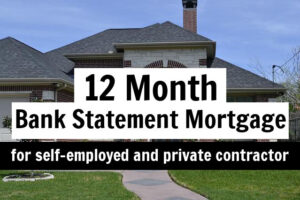Self-employment can be a rewarding and fulfilling career choice, but it can also present some challenges when it comes to securing a mortgage. If you’ve been self-employed for less than a year, you may find that lenders are hesitant to extend a mortgage to you due to the perceived risk involved. However, this doesn’t mean that it’s impossible to get a mortgage as a self-employed individual with a short work history.
With some careful planning and a little bit of patience, you can increase your chances of getting approved for a mortgage and owning your dream home.
Here we cover everything you need to know about getting approved for a self-employed less than 1 year mortgage.
Why can getting a mortgage with less than 1 year of self employment be a challenge?
First and foremost, it’s important to understand why lenders may be hesitant to lend to self-employed individuals with a short work history.
One of the main concerns is that self-employed individuals may not have a steady and reliable income stream, which can make it difficult to predict their ability to make mortgage payments.
Additionally, lenders may be worried about the stability of a new business, as it can take time for a business to become profitable and generate consistent income.
What can you do to increase your chances of getting approved for a mortgage if you’re self-employed and have been in business for less than a year?
Here are a few tips to keep in mind:
- Build up your credit score: A strong credit score can go a long way in helping you get approved for a mortgage. Make sure to pay all of your bills on time and keep your credit card balances low. You should also consider getting a credit card specifically for business expenses, as this can help you build a credit history for your business.
- Save up a larger down payment: Lenders may be more likely to approve a mortgage for a self-employed individual with a short work history if you’re able to put down a larger down payment. This can help to reduce the perceived risk to the lender and show that you’re financially responsible.
- Accumulate substantial reserves. Reserves are the amount of funds you have left over in verifiable assets after accounting for down payment, costs, and escrows (for taxes and insurance). The more number of months of mortgage payments you’re able to show in reserves, the better. Having strong reserves demonstrates that you have breathing room to cover bills even if your business slows down for a short period of time.
- Example: if your mortgage payment is $3,000/month and you have $36,000 in reserves, you have 12 months in reserves
- Work with a loan officer who is highly experienced with these types of non-traditional loans. A good loan officer can help you identify the best products that are available for self-employed borrowers and can guide you through the process of getting approved.
How to get Approved for a Mortgage if You’ve Been Self-Employed Less than 1 Year
For this type of scenario you’ll need to get a no income verification mortgage.
The loan approval is based on credit and assets.
These loans are only available on primary and 2nd homes.
Here are the credit, down payment, and reserve requirements to get approved without income documentation.
Home Purchase
| Credit | Down Payment | Reserves Needed |
| 740 | 20% | 12 months |
| 680 | 25% | 15 months |
| 660 | 30% | 18 months |
| 640 | 35% | 24 months |
Keep in mind, the reserves are the number of months left over in verifiable assets after factoring in down payment, closing costs, and escrows (for taxes and insurance).
Debt Consolidation Refinance
When consolidating debt and not receiving any cash out proceeds, here is what you can expect.
| Credit | Maximum Loan to Value Ratio | Reserves Needed |
| 740 | 80% | 12 months |
| 680 | 75% | 15 months |
| 660 | 70% | 18 months |
| 640 | 65% | 24 months |
Reserves can be shown in most recent statements from:
- Personal bank account
- Retirement account
- Brokerage account
- Business bank account (must provide proof of ownership in the business)
Your do not have to liquidate the funds for reserves, you just have to show that the funds are available.
Cash Out Refinance | Self-Employed Less than 1 Year Mortgage
If receiving cash out proceeds for home improvement or other purposes here is what to expect.
| Credit | Maximum Loan to Value Ratio | Reserves Needed |
| 740 | 70% | 12 months |
| 700 | 70% | 15 months |
| 660 | 70% | 18 months |
On a cash out refinance, you can use the cash out proceeds to fulfill the reserve requirement.
Steps to get a mortgage with less than 1 year self-employment:
Asset Calculation
Get an understanding of how much you have in available assets (checking/savings, retirement accounts, brokerage accounts, etc.), or how much equity you have in the property.
Credit Evaluation
If there are derogatory marks that you know need to be resolved, work on getting those items cleaned up so that you’re at 640+ score.
Apply with a Lender
Work with a loan officer that is very experienced with no income verification mortgages.
In Summary
While it may be more challenging to get a mortgage as a self-employed individual with a short work history, it’s not impossible.
By building up your credit score, carefully evaluating your assets, and working with a loan officer that is familiar with no income verification loans, you can increase your chances of getting approved for a mortgage even if you have less than a year of self-employment.
These loans are not available in all states. Feel free to check with me for eligibility as this can change.
I invite you to reach out below for further guidance.










What questions do you have?